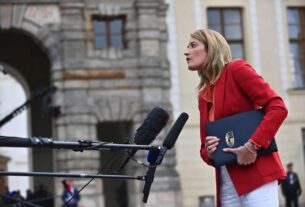LONDON — Boris Johnson was left fighting for his political life after two senior Cabinet ministers, including his chancellor, quit with a blast at his integrity.
Chancellor of the Exchequer Rishi Sunak, the finance minister and second most powerful figure in the U.K. government after Johnson, resigned minutes after Health Secretary Sajid Javid’s own dramatic exit.
Javid said he could no longer serve in Johnson’s government in “good conscience,” while Sunak called for government done “properly, competently and seriously” and gave voice to deep economic splits with Johnson.
The exit of the pair, who are close political allies and talked about as potential leadership contenders in the governing Conservative Party, comes amid a bitter row over the U.K. prime minister’s handling of misconduct allegations against a senior minister.
And it follows months of bad headlines for the premier over the so-called Partygate scandal, in which Johnson was fined by police for breaching COVID-19 regulations and his grip on No.10 Downing Street was called into question.
Officials in both Sunak and Javid’s team insisted their resignations, which came nine minutes apart, were not coordinated. An official close to Sunak said that the first he had learnt of Javid’s resignation is when he saw his letter.
Only last month, Johnson scraped through a confidence vote on his leadership, triggered by disgruntled Tory MPs, but he has been further bruised by days of bad headlines on his knowledge of misconduct claims against former government enforcer, Chris Pincher. Pincher resigned last week after allegations that he groped two men.
While current Conservative rules mean Johnson cannot face another confidence vote for 12 months, MPs have been urging senior Cabinet ministers to act against the embattled prime minister.
In his letter to Johnson, Javid said: “I am instinctively a team player but the British people also rightly expect integrity from their government.”
He said the public no longer thought the Conservatives were “hard-headed decision makers guided by strong values,” or “competent in acting in the national interest.”
In his own letter, Sunak said leaving was a decision he had not taken lightly, and said the public had a right for government to be conducted “properly, competently and seriously.”
And he stressed that, ahead of a joint speech with the prime minister due this week on the economy, it had become clear that their approaches were “fundamentally too different.” Sunak and Javid, himself a former chancellor who quit Johnson’s government once before in a row over the running of No.10, both position themselves as fiscal conservatives. Johnson has meanwhile favored a tax-and-spend approach that has riled some on his backbenchers.
In a stark example of divergence, Sunak was forced to perform a U-turn on slapping a windfall tax on oil and gas companies to help families cope with the surging cost of living.
Opposition Labour leader Keir Starmer said that the government was collapsing, but accused top ministers of being “complicit every step of the way” as Johnson “disgraced his office and let down his country.”
David Frost, once a close ally of Johnson as his former Brexit negotiator, said Sunak and Javid had “done the right thing.”
He said the developments of the last week showed there was “no chance of the prime minister either putting in place the necessary change of approach to running a government or establishing a new policy direction.”
This developing story is being updated.




